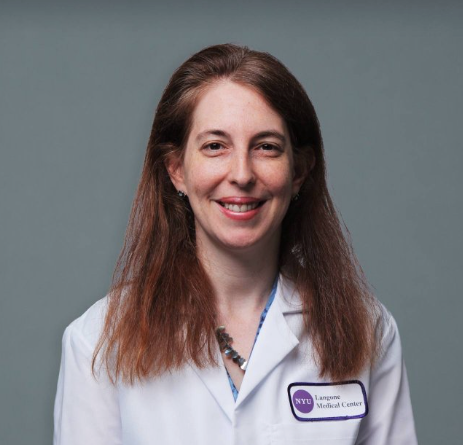- Center on Health Equity & Access
- Clinical
- Health Care Cost
- Health Care Delivery
- Insurance
- Policy
- Technology
- Value-Based Care
Dr Catherine Diefenbach on the Evolving DLBCL Treatment Landscape
Catherine Diefenbach, MD, an American Society of Hematology expert and director of the Clinical Lymphoma Program at NYU Langone's Perlmutter Cancer Center, discussed the evolving state of diffuse large B-cell lymphoma (DLBCL) therapeutics and exciting areas of research.
Diffuse large B-cell lymphoma (DLBCL) is the most commonly diagnosed type of non-Hodgkin lymphoma in the United States and worldwide, and even in the modern era of therapies and management strategies, the outlook for many patients is poor and rates of relapse remain high.1,2
Recent developments in the DLBCL treatment landscape, including new drug approvals, have brought hope to providers and patients, Catherine Diefenbach, MD, an American Society of Hematology expert, explained in an interview with The American Journal of Managed Care® (AJMC®). Diefenbach is also an associate professor at the NYU Grossman School of Medicine, director of the Clinical Lymphoma Program, and director of Hematology Translational Research at Perlmutter Cancer Center in New York.
Catherine S. Diefenbach, MD | Image credit: NYU Langone Health

Still, there are unmet needs in the space, including low cure rates among patients with high-risk DLBCL and those who relapse despite treatment with cutting-edge therapies. As the results of ongoing trials emerge, the DLBCL treatment paradigm may continue to shift, Diefenbach said. To learn more, AJMC spoke with Diefenbach about the evolving state of DLBCL therapeutics and exciting areas of research.
This interview has been lightly edited for clarity.
AJMC: How has the treatment landscape for DLBCL evolved in recent years?
The treatment landscape has evolved in very exciting ways. For the first time in over 30 years, a new drug, polatuzumab vedotin, has been approved in the frontline treatment of advanced DLBCL after the POLARIX trial (NCT03274492) met its end point demonstrating approximately 6% improvement in 24-month progression free survival.3 The approval of the bispecific antibodies glofitamab and epcoritamab offer new hope for long-term disease control to patients with multiply relapsed DLBCL.4,5 And the approval of 2 CAR T-cell therapy products in second-line DLBCL has changed the paradigm for first relapse in DLBCL from autologous stem cell transplant to CAR T,6 and increased the potential for cure with second-line therapy, even for patients who cannot obtain a complete response prior to CAR T.
AJMC: Where are the greatest unmet treatment needs for patients with DLBCL?
The greatest unmet needs are for patients with high-risk DLBCL, such as patients with double-hit disease, CD5+ disease, or rare phenotypes such a T cell–rich DLBCL. These patients have not traditionally obtained the same benefits from chemotherapy, and their cure rate is significantly lower than for patients who do not have these characteristics. For patients who relapse after CAR T, who are not fit for CAR T, or who relapse after bispecifics, there are very limited options for long-term disease control, and these patients remain a significant unmet medical need.
AJMC: Are there any novel therapies or ongoing trials in DLBCL that you are particularly excited about?
There are multiple trials ongoing integrating bispecific antibodies into frontline treatment and second-line salvage. If positive, these trials have the potential to once again change practice paradigms. Novel CAR T constructs, antibody-drug conjugates, and bispecific or trispecific antibodies are also in various stages of clinical development, and, if validated in larger trials, may be promising.
AJMC: Is there anything else that our audience should know about the DLBCL landscape?
I think these areas are the most important. There have also been some targeted therapies and antibody-drug conjugates approved—tafasitamab with lenalidomide and loncastuximab7,8—and these offer other options for multiply relapsed DLBCL, but they have not been paradigm changing.
References
1. Diffuse large B-cell lymphoma. Lymphoma Research Foundation. Accessed June 14, 2024. https://lymphoma.org/understanding-lymphoma/aboutlymphoma/nhl/dlbcl/
2. Rath K. Real-world study reveals key insights into DLBCL treatment patterns, outcomes. AJMC. April 18, 2024. Accessed June 14, 2024. https://www.ajmc.com/view/real-world-study-reveals-key-insights-into-dlbcl-treatment-patterns-outcomes
3. FDA approves polatuzumab vedotin-piiq for previously untreated diffuse large B-cell lymphoma, not otherwise specified, and high-grade B-cell lymphoma. News release. FDA. April 19, 2023. Accessed June 14, 2024. https://www.fda.gov/drugs/resources-information-approved-drugs/fda-approves-polatuzumab-vedotin-piiq-previously-untreated-diffuse-large-b-cell-lymphoma-not
4. FDA grants accelerated approval to glofitamab-gxbm for selected relapsed or refractory large B-cell lymphomas. News release. FDA. June 15, 2023. Accessed June 14, 2024. https://www.fda.gov/drugs/drug-approvals-and-databases/fda-grants-accelerated-approval-glofitamab-gxbm-selected-relapsed-or-refractory-large-b-cell
5. FDA grants accelerated approval to epcoritamab-bysp for relapsed or refractory diffuse large B-cell lymphoma and high-grade B-cell lymphoma. News release. FDA. May 19, 2023. Accessed June 14, 2024. https://www.fda.gov/drugs/drug-approvals-and-databases/fda-grants-accelerated-approval-epcoritamab-bysp-relapsed-or-refractory-diffuse-large-b-cell
6. FDA-approved CAR T-cell therapies. UPMC Hillman Cancer Center. Accessed June 14, 2024. https://hillman.upmc.com/mario-lemieux-center/treatment/car-t-cell-therapy/fda-approved-therapies
7. FDA grants accelerated approval to tafasitamab-cxix for diffuse large B-cell lymphoma. News release. FDA. July 31, 2020. Accessed June 14, 2024. https://www.fda.gov/drugs/resources-information-approved-drugs/fda-grants-accelerated-approval-tafasitamab-cxix-diffuse-large-b-cell-lymphoma
8. FDA grants accelerated approval to loncastuximab tesirine-lpyl for large B-cell lymphoma. News release. FDA. April 23, 2021. Accessed June 14, 2024. https://www.fda.gov/drugs/resources-information-approved-drugs/fda-grants-accelerated-approval-loncastuximab-tesirine-lpyl-large-b-cell-lymphoma
Fixed-Duration Epcoritamab Shows Strong Responses in Older, Chemo-Ineligible Patients With LBCL
December 27th 2025In the EPCORE DLBCL-3 study, fixed-duration epcoritamab monotherapy delivered deep, durable responses with manageable toxicity in older, chemotherapy-ineligible patients with LBCL.
Read More
